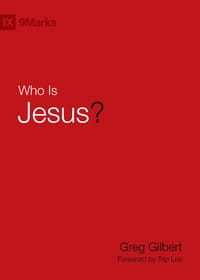Someone Had to Die
Share

The Jewish sacrificial system is sometimes said to have its origin in Israel’s escape from slavery in Egypt, but its deepest roots actually lie all the way back in the garden of Eden, in the sentence of death God pronounced over Adam and Eve when they chose to rebel against him. If you’re going to understand the Jewish sacrifices—and ultimately the meaning of Jesus himself—you have to understand that when God said Adam and Eve would die if they sinned, he wasn’t making an arbitrary decision. It’s not as if he could have said, “In the day that you eat of it, you shall surely turn into a toad” or something.
The reason God declared death to be the consequence for sin is that it was perfectly fitting and right for him to do so. As Paul would put it later on in the New Testament, “The wages [that is, the earned and correct payment] of sin is death.”2 It’s not hard to see why. First of all, when Adam and Eve sinned, they weren’t breaking some unimportant rule that God had put in place. As we’ve already seen, they were choosing to try to throw off his authority over them. Essentially, they were declaring their independence from their God. Of course, the trouble was that it was that very God—the One from whom they were declaring their independence—who was the Source and Sustainer of their lives. He’s the One who had breathed the breath of life into their lungs and who held them in existence, so when their relationship with him was broken—that is, when they were separated and cut off from him—their connection to the one and only Source of life was broken, too.
Not only that, but it is also right and good that God should be wrathful toward rebels. The Bible tells us that God is perfectly good and righteous and just in his very character. Given that, it shouldn’t be surprising that he reacts with hatred toward sin, which is by its very nature an embrace of evil and a rejection of what is good and right and just. Of course, God’s wrath is not like ours; it’s not explosive and out of control. It’s exactly the opposite—an intense, settled opposition to sin and a commitment to destroy it. That’s why God told Adam and Eve that they would die when they sinned, and it’s why every human being now lives under that sentence of death: by our sin—by our exchange of the goodness of God for selfish evil—we have earned God’s wrath and cut ourselves off from the Source of all life.
That’s the deepest origin of Israel’s sacrificial system. God was teaching his people that sin, by its very nature, deserves and demands death as its payment. But there was another principle God was teaching his people through the sacrifices, too, one that gave hope in the midst of what looked like abject hopelessness: the penalty of death did not have to be paid by the sinner!
Oh, it had to be paid by someone—death was still demanded for sin—but God, in love and mercy, allowed for the sentence of death to be executed on a substitute who would stand in the place of the sinner. If you think about it, you can see how this arrangement beautifully expressed both God’s unbending justice and his mercy. The penalty demanded by sin would be paid, and justice would be satisfied, but the sinner himself would not necessarily die.
Maybe the most poignant example of this principle was the Festival of the Passover, the celebration of how God had finally rescued his people from their slavery in Egypt. The Passover festival looked back to one particular night when God dramatically and terribly executed the sentence of death on the people of Egypt. Over and over again through the prior few weeks, God had warned Pharaoh that his refusal to let the Israelites go was earning nothing but death for him and his people. And nine different times, God had dramatized his power and sovereignty over Egypt through a series of plagues that afflicted the nation. Through those plagues, God was confronting and defeating the gods of Egypt, driving them one at a time to their knees and proving to the Egyptians that he and he alone is God.
The horror of the plagues came to its crowning moment in the tenth one. Here is how God described to Moses what he was about to do to the people of Egypt:
The LORD said to Moses, “Yet one plague more I will bring upon Pharaoh and upon Egypt. Afterward he will let you go from here. . . . About midnight I will go out in the midst of Egypt, and every firstborn in the land of Egypt shall die, from the firstborn of Pharaoh who sits on his throne, even to the firstborn of the slave girl who is behind the handmill, and all the firstborn of the cattle. There shall be a great cry throughout all the land of Egypt, such as there has never been, nor ever will be again. But not a dog shall growl against any of the people of Israel, either man or beast, that you may know that the LORD makes a distinction between Egypt and Israel.”3
This was a devastating judgment that God was about to pour out, but he also promised that his own people would be spared—if they would obey him and follow his instructions.
What God told his people to do must have been plenty frightening in itself. He told them that on the night the firstborn were to die, each family was to take a lamb—not a defective one, but one without any flaw or blemish whatsoever—and kill it at twilight. Then the family was to make a feast of the animal. But even more importantly, God told them they must take some of the animal’s blood and put it on the doorposts of their house. That was the key to it all, because God said that when he passed through the land of Egypt to kill the firstborn, he would see the blood on the doorposts and “pass over” that house, and the plague would not strike them. If they did all these things—if the lamb died and the family hid behind its blood—they would be saved.4
Now, stop and think for a second: you really have to wonder if the people of Israel were a little astonished to hear that God was going to go through their homes and villages, too! It hadn’t happened that way for any of the previous nine plagues. In those, the frogs and the gnats and the flies and the locusts and the hail and the darkness and the blood and the boils had affected all of Egypt—except the towns where the Israelites had been settled. Up to this point, God had been careful to make a sharp separation between them and the Egyptians, and they hadn’t had to do a thing except watch it all happen. But now, God tells them that he will visit their homes with the plague of death, and they will die just like the Egyptians if they don’t believe God and obey him.
The night when God went through the cities of Egypt, killing the firstborn one by one in judgment for the people’s sin, would have been terrifying. The land would have filled with the screams of the Egyptians as their children died in the night. One wonders if they were joined by the screams and wails of regret from Israelites, too—the ones who had not believed and who had scoffed at God’s word. The Bible simply doesn’t say.
Do you see what God was teaching his people that night? For one thing, it was a shocking reminder of their own guilt. When all was said and done, God was reminding them that they were no less deserving of the judgment of death than the Egyptians. They themselves were guilty of sin.
But there was another lesson, too. Seared into their minds and hearts would have been the power and meaning of the substitutionary sacrifice. Killing the lamb was not a clean affair; it was visceral and bloody. The father would kneel down beside the animal, draw a knife, and slit the animal’s throat, and the blood would spurt all over the ground until the animal staggered and gagged and fell into death. And as it happened, every eye would have instinctively risen from the dying lamb to one little boy, and the whole family would know: This lamb is dying so that little Joshua here won’t. The lamb is dying in Joshua’s place.
You see? God was teaching his people in a searing, visceral way that he wouldn’t—indeed couldn’t—simply sweep their sin away. Blood had to be shed because of it. Someone had to die, because that is the penalty that sin demands. And so as the father put the blood on the doorpost, scooped little Joshua into his arms, and shut the door of the house behind them, the whole family was learning that they were guilty and deserving of death. God wouldn’t spare them because of their own innocence. He wouldn’t save them because they were somehow less deserving of death than the Egyptians. No, he would pass over them because another had died in their place. As God passed over, with the drawn sword of judgment in his hand, they trusted in the blood of the lamb.
Notes
2. Rom. 6:23
3. Ex. 11:1, 4–7
4. x. 12:1–13

A famed historian once noted that, regardless of what you think of him personally, Jesus Christ stands as the central figure in the history of Western civilization. A man violently rejected by some and passionately worshipped by others, Jesus remains as polarizing as ever. But most people still know very little about who he really was, why he was really here, or what he really claimed. Intended as a succinct introduction to Jesus’s life, words, and enduring significance, Who Is Jesus? offers non-Christians and new Christians alike a compelling portrait of Jesus Christ. Ultimately, this book encourages readers to carefully consider the history-shaping life and extraordinary teachings of the greatest man who ever lived.